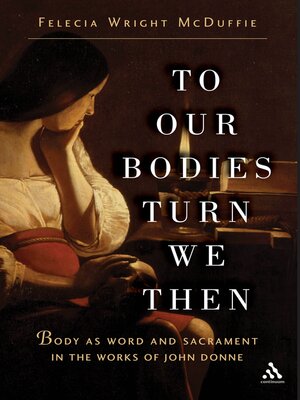To Our Bodies Turn We Then
ebook ∣ Body as Word and Sacrament in the Works of John Donne
By Felecia Wright McDuffie

Sign up to save your library
With an OverDrive account, you can save your favorite libraries for at-a-glance information about availability. Find out more about OverDrive accounts.
Find this title in Libby, the library reading app by OverDrive.



Search for a digital library with this title
Title found at these libraries:
| Loading... |
From his early love poetry to his late religious writing, John Donne speaks of the human body as a book to be read and interpreted. Unlike modern thinkers who understand the body as a purely material phenomenon or post-modern critics who see in it a "text" produced by culture, Donne understands the body as a (scriptural) text written by God.
In this study, McDuffie offers a comprehensive interpretation of Donne's reading of the body. In Donne's imaginative universe, the human person lies at the center of the great interconnected web of God's signs and acts. As such, he makes it the touchstone of his own theology. While his anthropology is basically orthodox, the emphasis Donne places on the body and the role it plays in his religious poetics are distinctive. Refusing to restrict God's revelation to the written words of Scripture, Donne turns habitually to the book of the human body as a collection of signs that indicate God's nature, his intent, and the human condition. He also, at times, represents the human body not as a "mere" sign but as sacrament: a seal of the promises of God that conveys his presence and grace.
In his reading of the book of the body, Donne discerns the narrative of salvation history: the trajectory proceeding from creation, through fall to redemption and resurrection. He sets the body and salvation history into a dialogical relationship, always reading one in terms of the other. Donne reads in the body God's great love for the material, the ravages of the Fall, God's redemptive action in Christ and in the lives of the saints, and the literal and figurative deaths that serve as gateways to resurrection and eschatological fulfillment.
In this study, McDuffie offers a comprehensive interpretation of Donne's reading of the body. In Donne's imaginative universe, the human person lies at the center of the great interconnected web of God's signs and acts. As such, he makes it the touchstone of his own theology. While his anthropology is basically orthodox, the emphasis Donne places on the body and the role it plays in his religious poetics are distinctive. Refusing to restrict God's revelation to the written words of Scripture, Donne turns habitually to the book of the human body as a collection of signs that indicate God's nature, his intent, and the human condition. He also, at times, represents the human body not as a "mere" sign but as sacrament: a seal of the promises of God that conveys his presence and grace.
In his reading of the book of the body, Donne discerns the narrative of salvation history: the trajectory proceeding from creation, through fall to redemption and resurrection. He sets the body and salvation history into a dialogical relationship, always reading one in terms of the other. Donne reads in the body God's great love for the material, the ravages of the Fall, God's redemptive action in Christ and in the lives of the saints, and the literal and figurative deaths that serve as gateways to resurrection and eschatological fulfillment.






